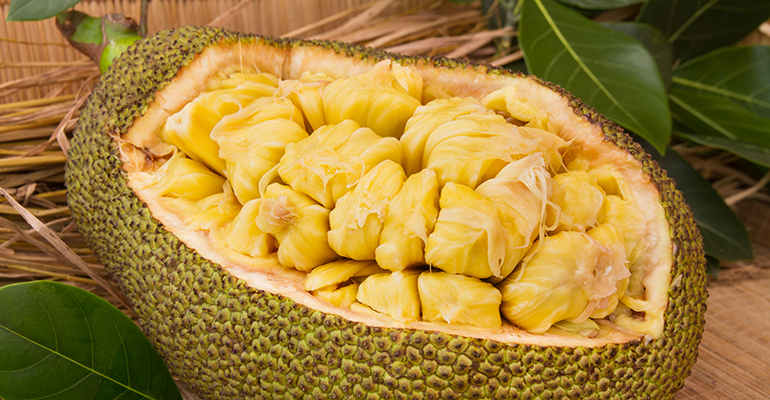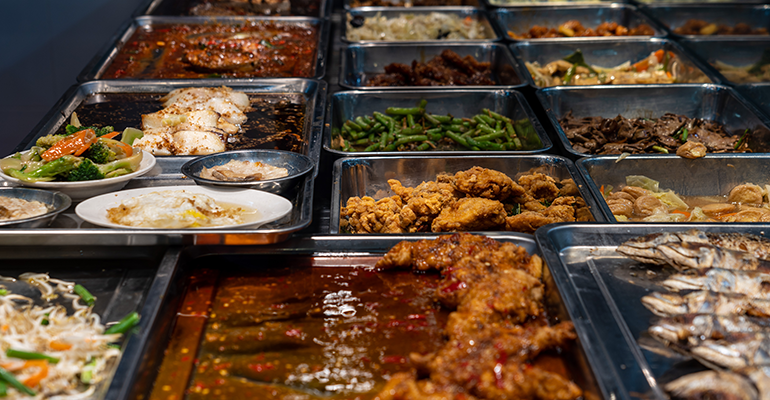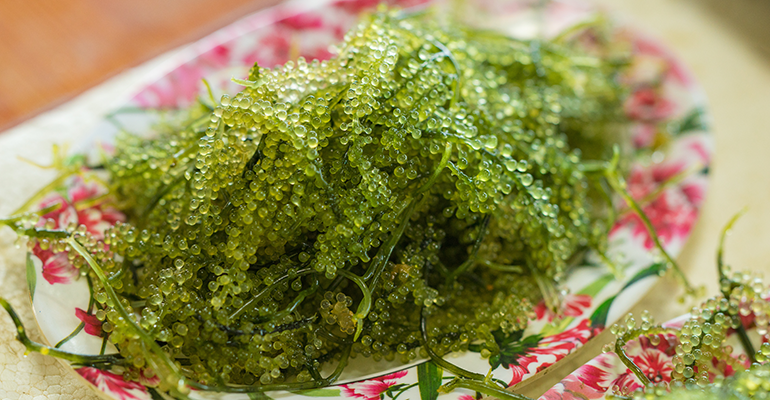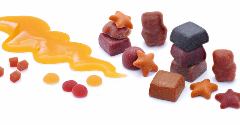News
Singapore startup uses jack fruit and banana blossom for plant-based products
15 May 2023
Singapore-based startup Jungle Kitchen has entered the vegan food market with its range of foods that include regional ingredients such as jack fruit, banana blossom, and cobra chili.
Its range, which includes Jungle Jack, a vegan mince made of ten vegetables, roots, and herbs; Jungle Fire, a hot sauce made from cobra chili; and Coconut Sambol, a Sri Lankan inspired coconut relish, aims to champion the quality and diversity of Southeast and South Asia cuisine.

The startup’s co-founders, Mukeeta Manukulasuriya and Surekha Yadav, are also keen to introduce Asian superfoods such as jackfruit and banana blossom that form part of the six-product line-up.
The inaugural range also includes polos curry, a jackfruit-based curry; jack in brine, jackfruit in a light brine; and banana blossom in brine, chunks of banana blossom chunks in a light brine.
‘The southeast Asian diet is traditionally quite vegan’
“I think we made a decision [to introduce a vegan line] based on the ingredients.” said Yadav in a recent interview with Singapore’s CNA938 radio station.
“The tropical world is so rich in fruits and vegetables, and we just wanted to focus on that high quality sustainably.
“The southeast Asian diet is traditionally quite vegan in the sense that we don't really have dairy. We tend to have more coconut milk, for example, so that also was a good fit.”
 © AdobeStock/hit1912
© AdobeStock/hit1912
The sustainability aspect of the product range was a particular consideration, with Jungle Kitchen also investing in its supply chain and encouraging more sustainable practices.
According to Yadev, who was speaking on Stanley Yung’s ‘Eat Drink Singapore’ programme, the reason why the co-founders sourced locally was to build strong relationships with farmers in the region.
“Regenerate farming is a big part of what we want to focus on,” she said. “So, we try to start from small farm builders who we can get to know personally, who are also not cultivating monocultures, who have multiple crops growing, who are actually cultivating of driving sustainable ecosystems.
“So currently we source from Sri Lanka. Eventually would like to expand that to Indonesia and to Malaysia.”
Startups use of local produce a unique selling point
Other southeast Asian firms experimenting with plant-based alternatives include Malesia’s NANKA, which has developed a range of alternative meat patties using young jackfruit pulp as a base.
The startup, which is currently eyeing up Japan as its next major market, has already launched product samples in the region and rolled out a Japanese version of its website.
Karana is another firm targeting Singapore with its jackfruit-based pork products. One of its first products is created from organic young jackfruit sourced from Sri Lanka that emphasise the ready-to-cook or ready-to-eat aspect of meal preparation.
Its signature innovation is the jackfruit-based pork Char Siew Bao, a traditional barbecue pork bun, popular in Chinese and East Asian cuisine.
In anticipation of what is a fast-moving market, Jungle Kitchen’s chefs are already working on their next range.
Products discussed include Asam Pedas Pisang Flower, a vegan alternative to sour and spicy fish curry, and Butter Jack Masala, which is jackfruit cooked in a buttery gravy.
Banana flour and seeds are future focal points
“We’re going to be adding more things as we perfect more heritage recipes, like with banana flour, because banana flour is an excellent substitute for fish,” said Yadav.
“We’re also looking to explore seeds, I guess we can call it seed to skin, which is the vegan alternative to nose to tail.
“We used to eat a lot of seeds and then at some point we forgot,” she added. “My grandmother used to make like jack seed curry or my aunt would boil seeds and make a sweet porridge for Sunday lunch.
Yadav also discussed the emergence of new ingredients ripe for innovation include such as the lato, a regional sea grape, which when bitten into can send a bubble-like burst of umami flavour.
 © AdobeStock/he68
© AdobeStock/he68
On the future issue of tracking local fruits and vegetables, Yadav acknowledged it was a challenge, commenting that it made sourcing large amounts harder.
“You have to respond to what's happening. The most important thing is as a community and as consumers, we need to start paying attention to providence.
Where does this thing come from? Where has it grown? Why did it grow there? What, what's special about this regional delicacy versus that regional delicacy? And I think that's also part of the exploration that we're hoping to do with our community.”
Related news

Bone broth: From old-fashioned to en vogue
24 Nov 2025
OXO’s entry into bone broth has turned the spotlight on this small but high-performance category – and there is still scope for growth, especially in the area of GLP-1 support.
Read more
Matcha madness: Why green is this year’s hottest colour
19 Nov 2025
Five years ago, it was a struggle to find matcha outside of Japan. Now it seems to be popping up everywhere, from coffee shops to supermarket shelves.
Read more
How younger consumers are redefining ingredient choices and rejecting brand loyalty
18 Nov 2025
Gen Z and millennial consumers’ preferences for transparency, functionality, and purpose are “redefining the very nature of consumption itself”, says SPINS.
Read more
Hybrid formats and flexible positioning to disrupt category norms in 2026
17 Nov 2025
Trend forecasters expect food and drink to move more fluidly across occasions, functions, and formats as consumers seek versatility, novelty, and convenience.
Read more
Empowering innovation in fortification and colouration
13 Nov 2025
Divi’s Nutraceuticals offers a large portfolio of innovative, high-quality ingredients for foods, beverages, and supplements, with bespoke solutions and expert support for product success.
Read more
Predictive maintenance redefines powder mixing reliability
13 Nov 2025
Mill Powder Tech's smart control systems harness real-time data to help the food and biotech sectors achieve zero downtime and smarter output, alongside rigorous GMP standards and ambitious ESG goals.
Read more
From fruit to functional solutions: Meet Paradise Fruits at Fi Europe in Paris
13 Nov 2025
Paradise Fruits Solutions and Paradise Fruits Health will showcase their combined expertise in delivering innovative, fruit-based solutions to the food and beverage industry at the upcoming Fi Europe trade show (2-4 December 2025, Paris).
Read more
Danone highlights digestive health as potential ‘tipping point’ for food industry
13 Nov 2025
Danone is betting on a food industry “tipping point” that will bloat the market for healthy products, particularly those related to gut health.
Read more
Bord Bia presents Irish dairy ingredient suppliers at Fi Europe
6 Nov 2025
Dairygold Co-operative Society, The Carbery Group, and Ornua Co-operative: Meet with sustainable producers of Irish dairy ingredients at Food ingredients Europe 2025, Hall 7.2 Stand M18.
Read more
Ingredient quantities mislabelled on popular protein bars, independent tests show
5 Nov 2025
Some popular protein bars contain more fat, carbs, and/or sugars than claimed on their labels, independent nutrition testing reveals.
Read more